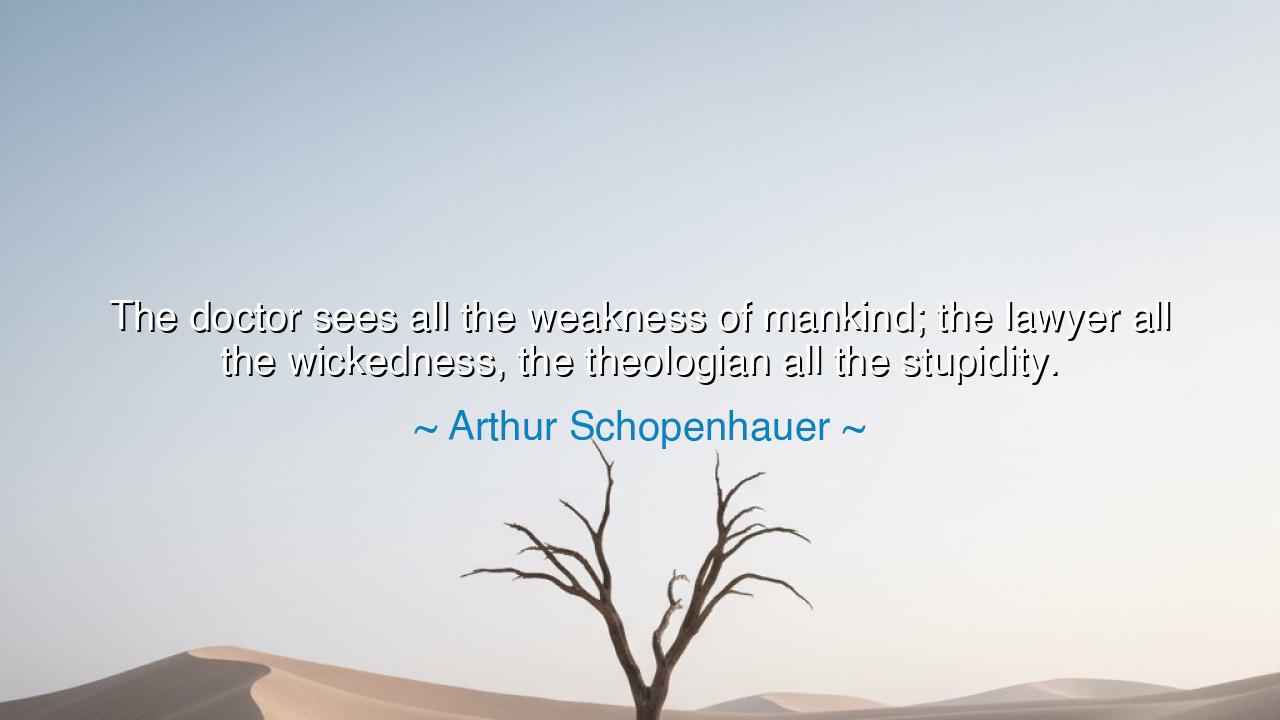
The doctor sees all the weakness of mankind; the lawyer all the
The doctor sees all the weakness of mankind; the lawyer all the wickedness, the theologian all the stupidity.






The words of Arthur Schopenhauer—“The doctor sees all the weakness of mankind; the lawyer all the wickedness; the theologian all the stupidity”—cut to the heart of human nature with the sharp edge of irony and truth. Schopenhauer, the dark philosopher of pessimism, often laid bare the vanity of human pretensions, and in this saying he speaks with the clarity of one who has gazed long into the frailties of men. He tells us that to each profession is unveiled a hidden side of humanity: to the doctor, the trembling body; to the lawyer, the corrupt soul; to the theologian, the stubborn folly of belief. Together, they form a grim but honest portrait of what we are.
The doctor, healer of bodies, cannot help but see the weakness of mankind. In the chambers of illness, the masks of pride are stripped away. The soldier becomes as helpless as a child when fever grips him; the king clutches the hand of the physician like a beggar when pain tears through his bones. Disease and frailty reveal that beneath our boasts of strength, we are dust, vulnerable to the smallest germ or wound. History itself remembers the Black Death, when even the mighty perished helplessly, and physicians saw humanity brought low by weakness that no sword could defeat. Thus, the doctor is daily reminded of man’s fragile nature.
The lawyer, by contrast, peers into the courts of conflict, and there beholds the wickedness of mankind. For who needs a lawyer save those entangled in greed, betrayal, and strife? In the disputes over inheritance, the quarrels between neighbors, the crimes of the ambitious and the desperate, the lawyer sees the dark theater of human selfishness. Recall the trial of Socrates: the courts, which should have defended wisdom, instead condemned him through envy and malice. The lawyer thus becomes the witness to the endless struggle of man against man, a mirror of our sins made public.
The theologian, lastly, dwells among the matters of faith, and there he encounters the stupidity of mankind. Schopenhauer does not mean this as a denial of all religion, but as a lament of the ways men twist the divine into folly. Superstition, blind dogma, and endless quarreling over words reveal how easily men mistake shadow for substance. History offers countless examples: wars fought over creeds, persecutions justified by scripture, and stubborn resistance to reason in the name of faith. The theologian, who seeks to guide the soul, often finds himself instead surrounded by ignorance clothed in the garments of piety.
Yet Schopenhauer’s saying is not only a criticism of these professions, but a revelation of humanity itself. For in truth, we are all weak, we are all wicked, we are all foolish at times. The doctor, the lawyer, and the theologian are not merely observers of others—they hold mirrors in which we may see our own condition. The wisdom lies not in denying his sharp words, but in accepting their sting and striving to rise above them.
The lesson is clear: if life exposes our weakness, let us strengthen one another with compassion. If the world reveals our wickedness, let us strive for justice, honesty, and reconciliation. If faith exposes our stupidity, let us seek wisdom humbly, acknowledging the limits of our understanding. We must not despise these truths, but use them as stepping-stones toward a higher humanity.
Therefore, let each person take heed. Do not hide from your weakness, but tend to it with care. Do not deny the wickedness that lurks within, but master it with virtue. Do not cling blindly to folly, but pursue wisdom with humility. For though Schopenhauer speaks with the sting of satire, his words point us to a path of honesty: to see ourselves as we are, so that we may strive to become what we ought to be. This is the teaching hidden within his irony, and it is a teaching worthy of remembrance.






AAdministratorAdministrator
Welcome, honored guests. Please leave a comment, we will respond soon